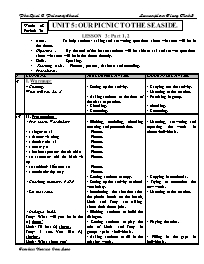Giáo án Tiếng Anh Lớp 5 - Nguyễn Cẩm Loan - Unit 5 - Lesson 3 (Part 1,2)

- Eliciting students to give model sentences from the dialogue and asking students to give the form, the use, the meaning and pronunciation of the pattern of the target language.
- Getting students to copy the
the target language.
Bạn đang xem tài liệu "Giáo án Tiếng Anh Lớp 5 - Nguyễn Cẩm Loan - Unit 5 - Lesson 3 (Part 1,2)", để tải tài liệu gốc về máy bạn click vào nút DOWNLOAD ở trên
UNIT 5: OUR PICNIC TO THE SEASIDE. Week: 08 Period: 30 LESSON 3: Part 1, 2 Aims: To help studens: asking and answering questions about what one will be in the future. Objective : By the end of the lesson students will be able to ask and answer questions about what one will be in the future fluently. Skills: Speaking. Teaching Aids: Pictures, posters, flashcars and recording. Procedures: T CONTENTS TEACHER’S ACTIVITIES STUDENT’S ACTIVITIES 4’ I. Warm up: * Chatting: What will you do? - Setting up the activity. - Asking students to the front of the class to practice. - Checking. - Correcting. - Carrying out the activity. - Listening to the teacher. - Practising in group. - checking. - Correcting. 14’ II. Presentation: * Pre- teach: Vocabulary - a singer: ca sĩ - a dancer: vũ công - a dentist: nha sĩ - a nurse: y tá - a business person: doanh nhân - an astronaut: nhà du hành vũ trụ - an archited: kiến trúc sư - a mechanic: thợ máy * Checking memory: R.O.R * Set the scene: * Dialogue build: Tony: What will you be in the (1) future? Linda: I’ll be a (2) singer. Tony: I see. You like (3) singing. Linda: What about you? Tony: I’ll be a (4) mechanic * Target language: What will you be in the future? -> I’ll be a singer. * Use: Asking and answering questions about what one will be in future. - Eliciting, modeling, checking meaning and pronunciation. + Picture. + Picture. + Picture. + Picture. + Picture. + Picture. + Picture. + Picture. - Getting students to copy. - Setting up the activity to check vocabulary. - Introducing the situation after the picnic lunch on the beach, Linda and Tony are talking about their future jobs. - Eliciting students to build the dialogue. - Getting students to play the role of Linda and Tony in groups - pairs - individuals. - Asking students to fill in the missing words. - Correcting. - Eliciting students to give model sentences from the dialogue and asking students to give the form, the use, the meaning and pronunciation of the pattern of the target language. - Getting students to copy the the target language. - Listening, answering and repeating the words in chorus-individuals. - Copying in notebooks. - Trying to remember the new words. - Listening to the teacher. - Playing the roles. - Filling in the gaps in individuals. - Checking. - Taking part in building the target language. - Copying in notebooks. 8’ III. Practice: * Pictures cues: a. an astronout b. a dancer c. a dintist d. a nusse e. an architect f. a busibess person - Running through the picture cue drills. - Modeling. T – Ss, Ss – T, Ss – Ss S1 – S2, S3 – S4 - Asking students to practice in pairs. - Monitoring and helping weak students. - Checking students’ practice in some pairs. - Listening and repeating after the teacher. - Repeating. - Working in pairs. - Open pair. - Close pair. - Listening and giving remarks. 8’ IV. Production: * Reader the words. 1. will/ you/ in/ what/ the/ future/ be/ ? 2. be/ dantist/ will/ I/ a - Asking students to reoder the words to make sentences. - Asking students to work in pairs or groups. - Going around offering help, if necessary. - Correcting. - Reodering the words to make sentences. - Working in pairs or groups. - Doing the task. - Correcting. 1’ V. Homework - Learn by heart the lesson. - Prepare: Lesson 3 part 3, 4, 5. - Setting tasks for students to do at home. - Taking notes on their notebooks.
Tài liệu đính kèm:
 giao_an_tieng_anh_lop_5_nguyen_cam_loan_unit_5_lesson_3_part.doc
giao_an_tieng_anh_lop_5_nguyen_cam_loan_unit_5_lesson_3_part.doc





